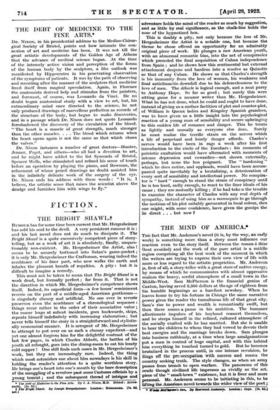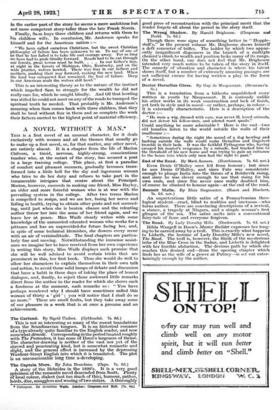THE MIND OF AMERICA.* THE fact that Mr. Anderson's novel
(it is, by the way, an early work) is something more than a story must influence our reaction even to the story itself. Between the roman these (best avoided) and the work of the pure artist is a middle region comprising all the best work of the moment in which the writers are trying to express their own view of life with more or less regard to the artistic proprieties. Mr. Anderson is, first of all, a story-teller with a great store of native energy, by means of which he communicates with almost oppressive realism the heavy, sordid atmosphere of a small town in the Middle-West. Sam McPherson is the financial genius of Caxton, having saved 3,500 dollars at the age of eighteen from his humble beginnings as a barefoot newsboy. When he leaves home to try his fortune in Chicago the same narrative power gives the reader the tumultuous life of that great city. Sam's rise to power and wealth is romantically swift, but then there comes a pause in his ambition. The humaner affectionate impulses of his boyhood reassert themselves, and he steeps himself in the refined, cultured atmosphere of the socially exalted wife he has married. But she is unable to bear the children to whom they had vowed to devote their best energies and the marriage breaks down. Sam plunges into business ruthlessly, at a time when large amalgamations put a man in control of huge capital, and with this behind him everything he touched turned to gold. But he becomes brutalized in the process until, in one intense revulsion, he flings off the pre-occupation with success and roams the country seeking truth. The style changes, as when an army passes from trench to open warfare. The panorama of this crude though civilized life impresses as vividly as the set. piece of the " small-town " existence, but it is freer and more personal. Mr. Anderson seems to be initiating in this, to be lifting the American novel towards the wider view of the poet ;
• wanks Markereen's Son. By tihexwood Anderson. London Cape. L7s. ed.j
in the earlier part of the story he seems a more ambitious but not more competent story-teller than the late Frank Norris. Finally, Sam buys three children and returns with them to his childless wife. In conclusion, Mr. Anderson speaks for himself and for the American nation :-
" We have called ourselves Christians, but the sweet Christian philosophy of failure has been unknown to us. To say of one of us that he has failed is to take life and courage away. For so long we have had to push blindly forward. Roads had to be cut through our forests, great towns must be built. . . . In our father's day, at night in the forests of Michigan, Ohio, Kentucky, and on the wide prairies, wolves howled. There was fear in our fathers and mothers, pushing their way forward, making the new land. When the land was conquered fear remained, the fear of failure. Deep in our American souls the wolves still howl."
This is an interesting theory as to the nature of the instinct which impelled Sam to struggle for the wealth he did not really care for, which he sought blindly. And till that howling was stilled he could not meet on any of the roads he tramped the spiritual truth he needed. That probably is Mr. Anderson's meaning when Sam comes back with three children, that they shall be bred without fear in them and so complete the work their fathers carried to the highest point of material efficiency.



















































 Previous page
Previous page